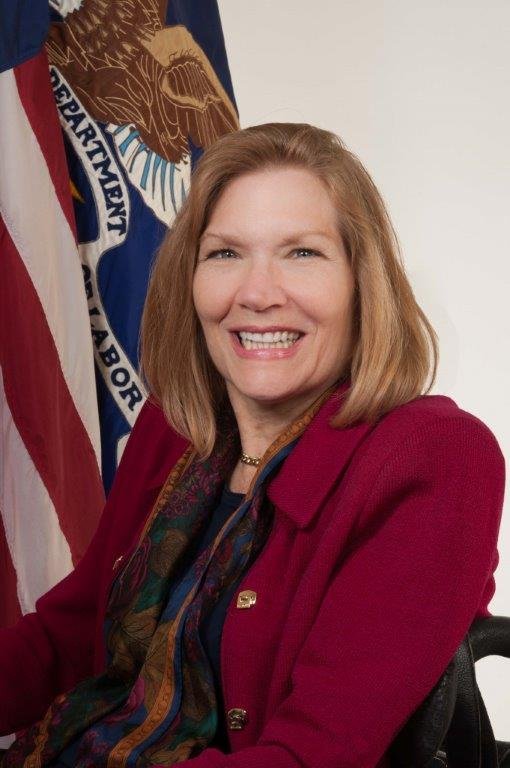Policy at Work: Celebrating 27 Years of the ADA
By Jennifer Sheehy, Deputy Assistant Secretary of Labor for Disability Employment Policy
 As a person with a spinal cord injury, and as the Deputy Assistant Secretary of Labor for Disability Employment Policy, July 26 is a special and significant day for me. It's the anniversary of the signing of the Americans with Disabilities Act (ADA), the landmark legislation designed to make American society more accessible to people with disabilities. This includes, of course, America's workplaces.
As a person with a spinal cord injury, and as the Deputy Assistant Secretary of Labor for Disability Employment Policy, July 26 is a special and significant day for me. It's the anniversary of the signing of the Americans with Disabilities Act (ADA), the landmark legislation designed to make American society more accessible to people with disabilities. This includes, of course, America's workplaces.
The ADA and employment
Signed by President George H.W. Bush in 1990, the ADA prohibits discrimination against people with disabilities in all aspects of community life, including employment. So, if you're an employee or a job seeker with a disability, you have the ADA to thank for a range of important employment protections.
For example, if you're looking for a job, the ADA ensures that job application procedures and hiring practices are open and equally accessible to people with disabilities. This means that employers must provide an accommodation, if needed, to participate in a job interview or take a pre-employment test. If you're working currently, or returning to work after an injury or illness, the ADA prohibits discrimination related to leave, advancement, compensation, training and other workplace practices. Overall, the ADA says people with disabilities, like all people, should be judged solely on their ability to perform the job at hand.
You can learn more about the ADA, and find technical assistance, on the Office of Disability Employment Policy's (ODEP) ADA web page.
Why we work
The ADA's protections are essential to our society because they break down barriers and allow us all to benefit from the significant skills and talents people with disabilities have to offer. But when it comes to employment, the ADA is even more important on an individual level, protecting the right of people with disabilities to work and lead full, productive lives. That’s why I'm such a strong advocate for helping people with disabilities find and return to work.
When I acquired my disability 22 years ago, work played an integral role in my recovery. I was an MBA student and intern at Anheuser Busch at the time, and while I was recovering in a rehabilitation center from my accident, the company's executive vice president came to visit and assured me there would always be a place for me when I was ready to get back to work. That simple act raised the expectations I had for myself and gave me confidence I needed to pursue work again and transition off Social Security disability benefits.
Although I ultimately followed a different path, the gesture significantly influenced my career going forward. It reminded me why work mattered to me, as both an individual and member of society. Today, with many years of career experience behind me, I realize that we all work for different reasons. Certainly, we work for practical reasons—to make money and provide for ourselves and families. But, there is more to work than that. We also work for self-fulfillment. That's certainly a big part of why I work. It's about the challenge and satisfaction that come with being part of something bigger than myself.
I find myself reflecting upon these sentiments every July, when the ADA anniversary brings inclusion and equality to the forefront. But, of course, we must remember to live out the spirit of the ADA every day of every month by advancing our own employment goals, and those of people with disabilities across America.
About the guest blogger
Jennifer Sheehy is the Deputy Assistant Secretary of Labor for Disability Employment at the U.S. Department of Labor (DOL). Through its Employment and Training Administration (ETA), DOL administers the nation's public workforce system, including the nationwide network of American Job Centers (AJCs), some of which are Employment Networks (ENs) under the Ticket to Work program.
About Ticket to Work
Social Security's Ticket to Work program supports career development for people ages 18 through 64 who receive Social Security disability benefits (SSI or SSDI) and want to work.
The Ticket program is free and voluntary. It helps people with disabilities move toward financial independence and connects them with the services and support they need to succeed in the workforce.
Learn more
To learn more about the Ticket program, visit www.ssa.gov/work. You can also call the Ticket to Work Help Line at 866-968-7842 or 866-833-2967 (TTY) Monday through Friday, 8 a.m. to 8 p.m. ET. Ask a representative to send you a list of service providers or find providers on your own with the Ticket program Find Help tool.